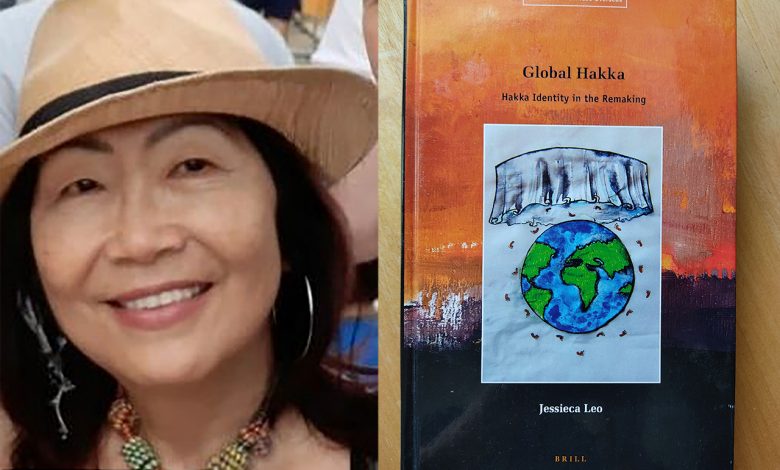

An academic book titled “Global Hakka: Hakka Identity in the Remaking” is a labour of love by Munich-based, Perak-born Dr. Jessieca Leo, also known as Leow Yok Shiam.
Ipoh Echo recently caught up with the academic author who hails from Beruas to learn more about her inspirational journey of completing the pioneering work in the form of a 543-page manuscript.
Jessieca, an alumnus of Methodist Girls School, Ipoh and Anglo Chinese School, Ipoh, first attended the University of Canterbury in New Zealand where she obtained her Bachelor of Science in Chemistry & Economics.
The globetrotter then moved to Germany in 1993 and proceeded to earn her Master of Arts (MA) and Doctor of Philosophy (PhD) from the Ludwig Maximilian University in Munich.
Starting off as her PhD thesis at the Ludwig Maximilian University, “Global Hakka” took 6 years of research and writing as well as another 3 years to transform it into a full book.
“I am a Hakka woman brought up in the traditional Hakka way. So, being Hakka is a very important part of my personal identity and selfhood. My Hakka identity went through many transformations as I study, live, work and travel around the world,” she expressed.
“While studying, I visited my mother in Beruas almost every year. It was during one of these visits at the start of 2000s that I was alarmed to hear more and more grandmothers were speaking to their grandchildren in Mandarin instead of Hakka and likewise, young Hakka parents spoke to their children only in Mandarin or English. This led me to wonder how Beruasians of Hakka descent, living overseas in foreign cultures around the globe, were conveying their Hakka heritage to their children,” she continued.
The thought sparked off her interest to conduct a case study on how ‘global Hakka’ from Beruas negotiated their Hakka identity in their host-countries and how their Hakka identity was being reshaped in the process.
“These preliminary findings were first presented at The Second Taiwan International Hakka Conference on Hakka Studies in 2008. I was surprised by the interest generated by my research which prompted me to switch my specialisation from History of Chinese Medicine to Hakka Studies,” the amiable Jessieca recalled.
To expand her research, she interviewed more than 100 Hakka who had migrated from their place of birth and living in different parts of the world including Malaysia, Singapore and Indonesia.
“It also turned out to be a journey of self discovery when I visited my ancestral village (Lu Zhu Tian) and the tulou (earthen buildings) in the south of China,” she reflected.
Exploring a topic close to her heart, her main concern centred around the direction in which the Hakka culture and identity was heading in the 21st century.
“My fieldwork and research showed that Hakka culture is not only waning but Hakka identity will be so adulterated that in two generations, there would not be many who can call themselves Hakka if we use the traditional way of identifying a Hakka using cultural markers such as ancestry, language, architecture, food, trade and occupation, religious belief, the so-called Hakka spirit, attire, artistic expressions, gender roles, rituals etc,” she pointed out.
“Since not many will be able to satisfy the criteria of being identified as a Hakka, I argued that we have to find new ways to address the problem of being Hakka in the 21st century. I proposed that looking at Hakkaness as part of their personal identity could help alleviate the problem. Hakkaness is an inclusive and open concept where elements of Hakka identity can be claimed, disclaimed, reclaimed, ascribed or appropriated by others. It can be a quality that one can embrace or discard to varying extents; display in the open or hide away,” she elaborated.
According to her, any individual can claim Hakkaness as part of their elastic personal identity or personhood regardless of the percentage of blood ancestry or whether that person can or cannot speak the language.
“In short, it is a personal cultural construct that can be embraced, transformed and reformed in any way that one finds relevant in the global context. In this sense anyone can claim to have Hakkaness if they can find affinity with Hakka identity elements,” she pointed out.
“Hence, Hakkaness is a better choice to describe the concept of ‘being Hakka’ in the 21st century. I hope this concept will make it easier for those who want to explore their Hakka heritage,” she concluded.
Professor Dr. Michael Hsiao, Chair Professor of Hakka Studies for the National Central University in Taiwan gave the following review: “It is a good academic work with much researched materials and interesting arguments. The author is quite informed of the Hakka studies scholarship and its related debates and concerned issues.”
“This manuscript makes a good contribution to the field of Hakka studies by putting many related questions together and delineating them in a rather systematic way. The author did a good job in Chapters 4 and 6 by having presented a useful review of related existing literature,” Professor Dr. Michael Hsiao stated, adding that the book should first be made known to scholars and researchers in Hakka studies and community leaders of Hakka associations around the world.
Professor Wang Gungwu, University Professor of the National University of Singapore shared similar sentiments: “This book explores with great sensitivity how Hakka history outside China influences the way they respond to the new global environment. Combining careful scholarship with self-discovery, Jessieca Leo captures the processes by which one group of Chinese became migrants who consider migration as normal.”
“Her fascinating and original work takes the study of the Hakka to a higher level and offers fresh insights for understanding how other migratory Chinese are transforming tradition today,” the renowned historian and sinologist who grew up in Ipoh was quoted as saying.
Presently, interested readers or researchers in Malaysia can access the academic work online on academic sites, Amazon and Brill among others. Internationally, the hardback is available at libraries of universities and the National Libraries.
The book is also set to be translated into Chinese for publication in 2024.
by Tan Mei Kuan


